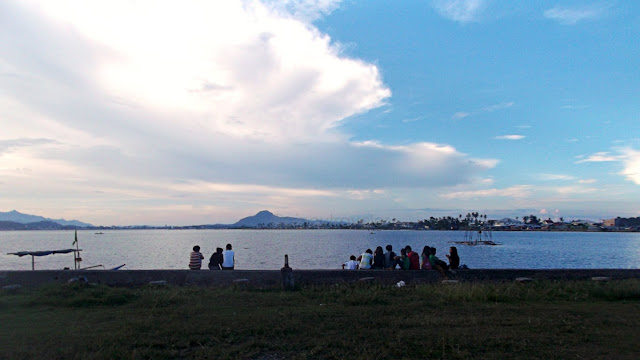Oh Larang
#Philippines
I have yet to know about etymologies but this thing sure tastes good! And being a “tinowa addict” that I already am, Larang is making me have second thoughts if I should call myself a “larang addict” too!
Its fish too! And like the tinowa (written as tinola), Larang also swims in broth, the more the merrier! Its not as clear as tinowa since color from the ingredients add a bit towards making it just a little orangy or yellowish than tinowa – but still a clear soup nonetheless! The taste? Heavenly! Like the tinowa, its not offensively sour as the sinigang in Manila. But compared to tinowa, larang has a little bit more body or thickness in the broth – just a little bit. There is some bit of sourness but just a little bit too! More of the herbs play in your mouth for an after taste than tinowa.

I asked what makes the difference and discovered something I might try at home soon! First, the coloration comes from the ingredients because they are sauteed together with the fish before water is added. Hmm… and yumm! So the tomato’s orange color, the yellow in ginger, the brown in garlic and so on gets to the pan more during the sautee process. those and other things give the larang its color and more taste. In tinowa, you just boil water then dunk everything later. That’s what I learned!
Like tinowa too, I find it good at breakfast, lunch or dinner!
Where can we have larang? The best indicator is to look for eateries (usually turo-turo) that have those big big kawali displayed. There would usually be two – one is tinowa and the other is larang. There are many all around Cebu, but not as ubiquitous as pungko-pungko.
One place I like is this place in Mandaue just behind the Caltex station across San Miguel. Always teems with people especially in the evenings. Even a bit crowded during weekend evenings. The eatery’s name is “Wel & Vic Kan-anan” but people usually call it “larangan” – meaning, where larang is made or sold!
Let’s have more about “Larangan” in the next story!
I have yet to know about etymologies but this thing sure tastes good! And being a “tinowa addict” that I already am, Larang is making me have second thoughts if I should call myself a “larang addict” too!
Its fish too! And like the tinowa (written as tinola), Larang also swims in broth, the more the merrier! Its not as clear as tinowa since color from the ingredients add a bit towards making it just a little orangy or yellowish than tinowa – but still a clear soup nonetheless! The taste? Heavenly! Like the tinowa, its not offensively sour as the sinigang in Manila. But compared to tinowa, larang has a little bit more body or thickness in the broth – just a little bit. There is some bit of sourness but just a little bit too! More of the herbs play in your mouth for an after taste than tinowa.

I asked what makes the difference and discovered something I might try at home soon! First, the coloration comes from the ingredients because they are sauteed together with the fish before water is added. Hmm… and yumm! So the tomato’s orange color, the yellow in ginger, the brown in garlic and so on gets to the pan more during the sautee process. those and other things give the larang its color and more taste. In tinowa, you just boil water then dunk everything later. That’s what I learned!
Like tinowa too, I find it good at breakfast, lunch or dinner!
Where can we have larang? The best indicator is to look for eateries (usually turo-turo) that have those big big kawali displayed. There would usually be two – one is tinowa and the other is larang. There are many all around Cebu, but not as ubiquitous as pungko-pungko.
One place I like is this place in Mandaue just behind the Caltex station across San Miguel. Always teems with people especially in the evenings. Even a bit crowded during weekend evenings. The eatery’s name is “Wel & Vic Kan-anan” but people usually call it “larangan” – meaning, where larang is made or sold!
Let’s have more about “Larangan” in the next story!


Comments
Post a Comment